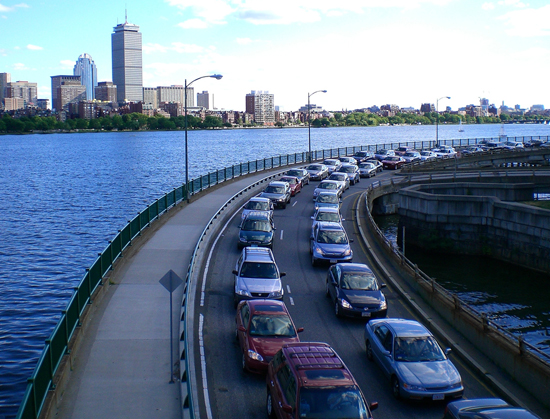Gridlock and Global Warming in BU’s Sights
City, University, IBM team up on research project

Curbing greenhouse gas emissions from Boston’s infamous traffic mishmash is the target of a new project by BU and the city. Photo by Josh Michtom
Battling climate change and helping unknot Boston’s snarled and snarly motorists: IBM says that mix of global and on-the-street local impact is worth roughly $400,000.
That’s the Smarter Cities grant that the company has given the city of Boston, which in partnership with BU is researching a first-of-its-kind plan for managing traffic while cutting carbon dioxide emissions. Nationally, one-third of those emissions come from on-road transportation and urban traffic congestion, says Lucy Hutyra, a College of Arts & Sciences assistant professor of geography and environment.
Currently, the city uses live traffic cameras and underground sensors that detect when cars are passing and where, says Hutyra, co–principal investigator on the project. The Smarter Cities grant aims to develop a new and better way to measure the number of miles traveled by all private vehicles in Boston on a given day.
Reducing those vehicle miles traveled (VMT)—for example, with expanded bike lanes, better-timed traffic signals, and public transit improvements—is the city’s goal, but the efficacy of each of these efforts is unclear, “because we cannot determine VMT with the level of accuracy or spatial and temporal resolution needed” at present, according to Hutyra. The grant will pay for researchers to develop better, space- and time-oriented traffic counts and determine their associated carbon dioxide emissions. “We need to be able to measure VMT in near real time at the block or neighborhood level,” she says. The project includes development of “a new data portal and visualization system” for use by city officials.
In the most intensive stage of the research, IBM consultants will join the Boston and BU researchers for three weeks this month, at the end of which the city will have information on a few specific intersections they can then use in shaping future policies.
“Over the last several years, colleagues and I have been working on improving estimates of on-road emissions,” says Hutyra. IBM’s grant is “a critical catalyst to get this particular project off the ground.” Faculty from the School of Management and the College of Engineering are also working on the project, as is BU’s interdisciplinary Sustainable Neighborhood Lab, she says. A recognized up-and-comer in climate research, Hutyra recently won a National Science Foundation CAREER award for junior faculty.
BU and Boston have collaborated on urban improvement initiatives for some time, and the Smarter Cities effort has groundwork from a partnership between the city’s air pollution control office and the University’s Urban Metabolism research project, which seeks to mitigate greenhouse gases locally.
President Robert A. Brown says that “with the expertise that Boston University can offer, we expect that we will help identify ideas that will have a positive impact in both traffic management and environmental improvement” in the city.
For all the congressional paralysis over climate change legislation, Boston has taken local steps to curb municipal greenhouse gas emissions, according to city officials. Using the standards of the Kyoto Protocol, Boston cut its greenhouse gas emissions to 7 percent below 1990 levels, and did so a year ahead of the 2012 scheduled completion. They achieved the reduction by using green vehicles, buying renewable energy, and retrofitting municipal buildings. Mayor Thomas Menino (Hon.’01) has called for further cuts of 25 percent by 2020 and 80 percent by 2050.
Those efforts helped persuade IBM to include Boston among the 33 cities selected, from 140 applications, for grants. Besides Beantown, U.S. winners were Atlanta, Durham, N.C., Houston, Jacksonville, Louisville, and Pittsburgh. IBM says Smarter Cities grants are the company’s largest philanthropic effort.
“Aside from it being the right thing to do, our employees live and work in places like Boston,” IBM spokesman Ari Fishkind says. “The economic, environmental, and social success of the communities in which we live and work is our success, too.” Company employees find meaning in the research and hone their skills doing it, improving their service to IBM clients, he adds.

Comments & Discussion
Boston University moderates comments to facilitate an informed, substantive, civil conversation. Abusive, profane, self-promotional, misleading, incoherent or off-topic comments will be rejected. Moderators are staffed during regular business hours (EST) and can only accept comments written in English. Statistics or facts must include a citation or a link to the citation.